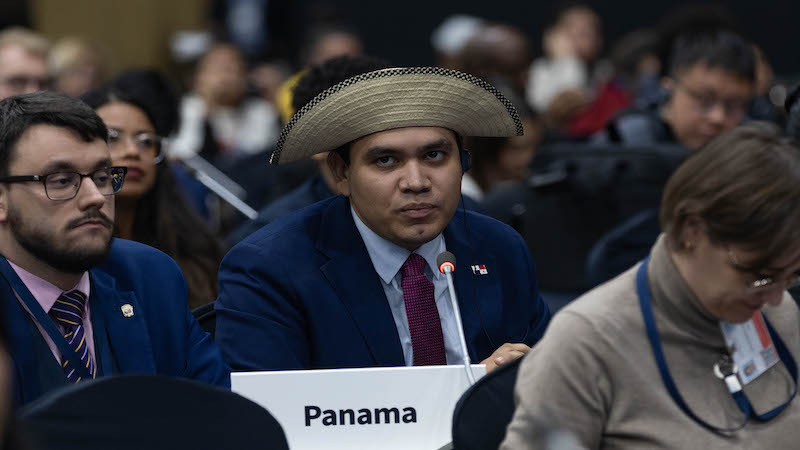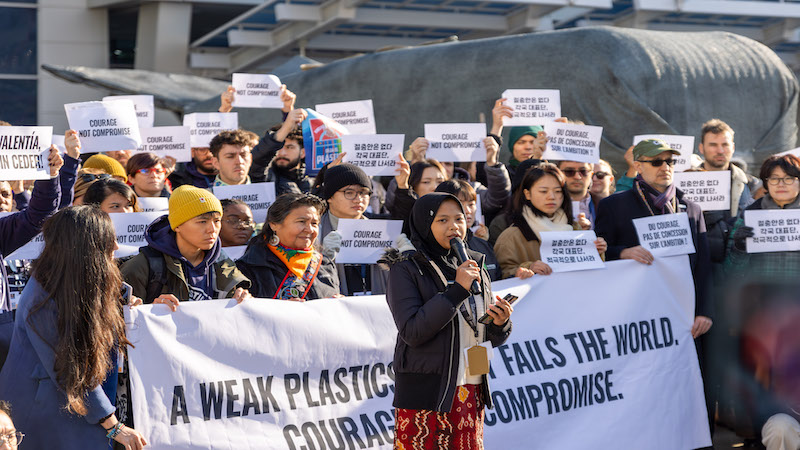Diplomats from high-ambition countries urge petrostates to compromise as latest draft text for a global treaty to end plastic pollution leaves all to play for
As the plastics talks staggered towards a close without a deal on a new global treaty in sight on Friday, Juan Carlos Monterrey Gómez had a straightforward request for the petrostates seen as blocking progress: “Get out of the way” if you’re not ready to compromise.
The stern message from Panama’s special representative pointed to a ramp up in political rhetoric from the large coalition of countries that is pushing for the inclusion of plastic production cuts in a UN pact designed to end plastic pollution.
A group of oil and gas-producing countries – led by Saudi Arabia, Russia and Iran – have remained resolute in their opposition to manufacturing curbs. After half a day of backroom bargaining and closed-door sessions proved largely futile, delegates waited for a breakthrough, with fewer than 36 hours to go until the gavel is due to come down in the South Korean city of Busan.
In a bid to break the stalemate, the chair of the talks, Luis Vayas Valdivieso of Ecuador, penned a new draft text and released it mid-afternoon. The 23-page proposal is more fully formed than previous iterations, but still features wide-ranging options on several issues. For example, there are eight different definitions to choose from for what the word “plastic” should mean in the context of a future treaty.
Fossil fuel lobby secures “record” access to crunch talks on new plastics pact
On the fraught question of plastic production cuts, however, Valdivieso offered a stark binary choice: either nothing at all or an agreement to adopt “a global target to reduce the production of primary plastic polymers to sustainable levels”, which would be set at the first plastics COP (conference of the parties) after the deal in Busan.
The first option reflects the position of the petrostates arguing that manufacturing curbs fall outside the scope of the pact. That’s despite the fact that the original resolution underpinning the talks indicated the treaty should address “the full lifecycle of plastics” – meaning from production through to consumption and waste.
The second option is lifted straight from similar proposals put on the table on Thursday by an alliance of 102 countries across the developing and developed world, representing nearly 60% of all nations engaged in the talks.
This option would see all countries “take measures across the full lifecycle of plastics” and report data on their plastic supply chains. It also calls for the creation of a five-year review process similar to the global stocktake of climate action under the Paris Agreement.
‘Forget red lines’
Appearing after the text’s release in his trademark hat, Panama’s Monterrey Gómez told reporters that the high-ambition group had already made compromises by dropping stricter targets and it was time for others to also “forget about red lines”.
“We are not here to negotiate a greenwashing recycling global treaty,” he added.
Sitting next to him, Andrew Yatilman, secretary of the department of environment and climate change for the Federated States of Micronesia, pleaded with petrostates to “give us a break”.
“The Gulf states want to protect their economy with fossil fuels,” he said, “but what about us? Our economy is based on fishing and that is getting destroyed by plastic pollution.”
Earlier in the day, campaigners stood in front of an art installation depicting a sperm whale stuffed with plastic waste for their most vocal action during the week so far. Holding signs with messages like “courage not compromise”, the activists warned that members of the “High Ambition Coalition” were “sleepwalking into a treaty that will not be worth the paper it will be written on”.
Campaigners deliver a statement in front of the venue for the UN talks in Busan, South Korea. (Photo: Markus Winkler)
“They must not compromise under pressure exerted by a small group of low-ambition states and hinge the life of our planet on unachievable consensus,” their spokesperson shouted, calling for countries to make decisions at the talks by voting rather than relying on consensus.
While the possibility of invoking a two-thirds majority vote remains open, on Friday night heads of country delegations were still trying to find a common path to a joint deal.
China could play a deci
Read More



